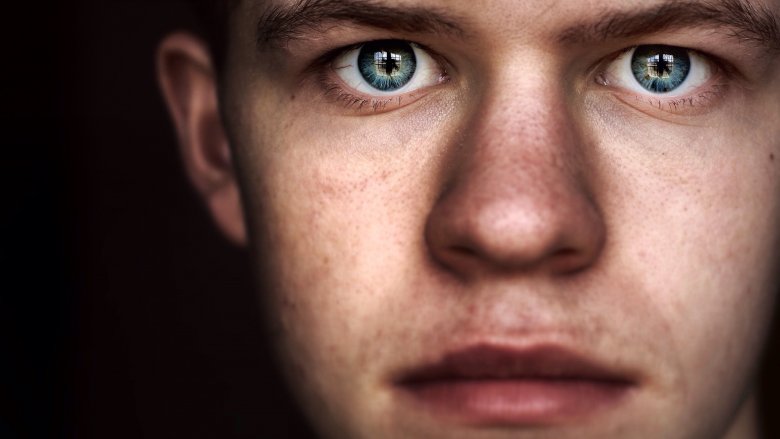Traits That Most Serial Killers Eerily Have In Common
One of the things that terrifies us the most about serial killers is randomness. Serial killers choose victims at random, and they seem themselves to be somewhat random — many people who have known serial killers have described them as the "average Joe," one of millions of average Joes, most of whom don't turn out to vicious killers. But you may be comforted to learn that most serial killers do have characteristics that can help separate them from all those other, non-serial killing average Joes. Unless, of course, you happen to know someone who has all these characteristics ... then you're probably not comforted at all.
Serial killers often have personality disorders
Most serial killers suffer from some kind of personality disorder. According to the FBI, that's often psychopathy or antisocial personality. The difference between the two is nature vs. nurture: A psychopath is born that way — the impulse control and emotional centers of his or her brain are underdeveloped. By contrast, antisocial personalities are learned, and usually develop during an abusive or neglected childhood. Now, this does not mean serial killers are insane, which is why the "not-guilty by reason of insanity" defense rarely works for a serial killer. In order to be deemed criminally insane, people must demonstrate that when they committed their crimes, they could not tell the difference between right and wrong. Serial killers know very well the difference between right and wrong, they just don't care.
Also called "sociopaths," people with antisocial personality disorder "show no regard for right and wrong" and often possess other qualities that are common to serial murderers, such as a lack of remorse, callous or manipulative behavior, and impulsivity. But it's also important to note that sociopaths are not all killers — in fact the vast majority of them are not. So while you may not necessarily be in danger from the sociopath who lives in your neighborhood, you should probably at minimum not allow yourself to be taken in by his or her charms.
Serial killers exhibit predatory behavior
In his book Real-Life Monsters, criminal investigator Stephen J. Giannangelo calls the "calm, purposeful behavior" of a serial killer "predatory aggression," comparing it to the aggressive behavior of carnivores. Predatory animals kill to satisfy a need, so there isn't any rage behind the action. In other words, a serial killer kills because he thinks he needs to, while other killers may kill because they are provoked.
A person who has a "predatory aggressive personality" believes other people are inferior, which makes it easy for him to justify hurting or preying on others. Serial killers don't have normal human empathy, but they're very good at pretending like they do, so it's incumbent upon the rest of us to learn how to recognize fake empathy when we see it. Chances are, if your instinct tells you someone is just going through the motions when it comes to exhibiting empathy, love, or concern, then your instincts are probably correct.
Serial killers are manipulative
Serial killers are manipulative, but they're also very good at making sure you don't know you're being manipulated. We all operate under the premise of believing that evil is something distant — that the person we just met or the person who lives next door to us couldn't possibly be evil, mostly because we like to believe that horror is something that happens in movies and to other people. According to Psychology Today, Jeffrey Dahmer's father simply accepted his son's lies at face value because it was easier for him to believe the lies than to admit to himself that his son was a monster.
But even those of us who aren't already emotionally invested in a relationship with a dangerous person can be manipulated. Superficial charm can lull just about anyone into a false sense of security, so it's important to be on the lookout for it.
Generally speaking, if you're being flattered and distracted with gifts, and if those actions appear designed to cover something up, like flaws in a story, the whereabouts of a missing item, or a bizarre favor or demand, you need to keep your guard up. Psychopaths look for your vulnerabilities and try to use them against you, so you need to know what your vulnerabilities are.
Serial killers exhibit 'sensation-seeking' behavior
People who commit serial crimes, especially serial rape and murder, often do it because they're trying to feel something. This is called "sensation seeking" behavior, and according to The University of Melbourne, there may be a genetic component to it. A 1997 study that looked at the behavior patterns of twins raised in separate households found that both sensation-seeking behavior and impulsivity were not matters or nurture, but of nature. In other words, it's a quality that many serial killers are born with.
Interestingly, a 1965 experiment conducted by pioneering criminal psychologist Robert Hare found that psychopaths (which make up a large percentage of the serial killing population) tolerate electric shock far more than people who are not psychopaths, which suggests not only that they don't fear punishment but that they may be numb to sensations that affect other people in profound ways. In Hare's experiment, psychopaths and normal volunteers were hooked up to an electric shock-inducing machine and told to watch a countdown timer. When the countdown timer reached zero, they were given an electric shock. The normal subjects showed signs of extreme anxiety and agitation as the timer approached zero, but the psychopaths were all, "Bring it on." These troubling results show that psychopaths don't really fear the consequences of their actions, and that they may seek increasingly extreme stimulus, since they're numb to many of the experiences that create emotion in the rest of us.
Serial killers often suffered some kind of childhood abuse
Abuse during childhood is not a direct path to serial killerdom, but many serial killers were abused as children. A Radford University study looked at the childhood experiences of 50 serial killers and discovered that 68 percent of them had experienced "some type of maltreatment," either physical, sexual, psychological, or neglect. Earlier research found similar numbers, and one study even reported that 100 percent of serial killers studied had suffered some kind of abuse in childhood.
David Hosier of Childhood Trauma Recovery says psychological abuse in particular has a strong correlation with future behavior — children who are shamed or humiliated or are punished disproportionately can develop a propensity for cruelty as a direct result of that abuse. Neglect, too, is a big factor because when children don't experience empathy from a parent or caregiver, they sometimes don't develop the ability to empathize with others.
Serial killers have a need for control
Psychological disorders or childhood abuse can leave people with feelings of helplessness, and for a disturbed person with the potential to commit violence, that's a terrible personality flaw. People who feel like they're helpless to control their own lives and situations will sometimes look for smaller, more manageable areas of their lives that they can have complete control over. If the person lacks empathy, that area may consist of other human beings.
According to Steven Reddy of Duquesne University School of Law, childhood abuse isn't the only factor in a person's past that can lead him to develop that oversized need for control. Kids who come from unstable homes — moving frequently, being shuttled between foster homes, etc. — may feel like they have no control over their lives, and as a double whammy also don't have time to develop real relationships with their peers. So not only do they have control issues, they also have deficiencies in empathy simply because they have so few friendships with which to learn and develop the sense of empathy that all normal human beings possess. Lack of empathy combined with a pathological need to control others is a deadly combination.
Serial killers often don't show remorse
Serial killers almost always lack remorse. That's not really surprising, since the ability to repeat a brutal crime sort of depends on not feeling too bad about the first time you committed a brutal crime. In his book Serial Murder and the Psychology of Violent Crime, Richard N. Kocsis says lack of remorse isn't necessarily specific to psychopaths and sociopaths, which is terrifying, so thanks for that, Richard. People who have fairly ordinary psychological makeups can also kill without remorse, provided they can successfully "compartmentalize and dehumanize" the people they kill. You know, "It puts the lotion in the basket."
Most of the time, though, lack of remorse is directly related to a killer's lack of empathy. If you're unable to empathize with someone who is afraid or in pain, you aren't going to feel much (if any) remorse about ending that person's life.
Serial killers are trying to fill an emotional void
People who are engaged in selfish pursuits are almost always trying to fill an emotional void. Psychologist Marcia Sirota says such people may not have received much love and affection as children, or that they observed others engaged in selfish pursuits and are trying to emulate that behavior as adults. Serial killers in particular are often described as emotionally vacant and incapable of forming meaningful personal relationships.
Serial killers have this quality in common with drug addicts — people who abuse drugs are looking for some sort of emotional experience that can replace the emotional experiences they don't have access to, usually relationships with other human beings. Having healthy relationships with others is a crucial component of psychological health — it's what makes us human.
Interestingly, many billionaires also fall into the "emotional void" category. The relentless pursuit of money, like the relentless pursuit of drugs or murder, is just another way to try and fill the need for love and human affection.
Serial killers enjoy having power over others
Psychologists divide serial killers up into categories. There are killers who are "act-focused" — these people typically kill because they feel like they're on some kind of crusade, for example, "to rid the world of prostitutes." Killers who are "process-focused" are the more sadistic variety. To put it bluntly, they enjoy watching people suffer, so they usually torture their victims before killing them. According to Psychology Today, the most common type of serial killer is the "power/control" process-focused killer. John Wayne Gacy, Ted Bundy, and Dennis Rader all fall into this category.
Power killers can be said to have a sort of god complex. They kill slowly because the ability to decide how and when their victims will die makes them feel empowered. Most killers who sexually assault their victims aren't motivated by lust, they're motivated by the feeling of power they get from the act.
Serial killers are vain and narcissistic
One of the FBI's favorite techniques for interviewing serial killers is flattery. Psychopathic killers in particular tend to have a grandiose sense of their own self-worth, so investigators can use praise to get them talking. In an FBI document about serial murder, behavioral analysts said psychopathic serial killers don't respond to "altruistic interview themes," in other words, trying to make them experience feelings of guilt or sympathy for their victims is a waste of time. Instead, interviewers might praise them for their intelligence or for their skill at outwitting investigators.
Forensic psychologist Stephen A. Diamond calls this quality "psychopathic narcissism," and likens it to an "immature, selfish, self-centered, resentful, and raging child inside a powerful adult body." Children are inherently narcissistic and must be taught the rules of social behavior, but when children grow up physically but remain in a state of immaturity, they can become extremely dangerous people.
Serial killers may have addictive personalities
Most people who have "addictive personalities" today are addicted to cell phones, or maybe Chapstick. More dangerous addictions might include drugs, alcohol, or cigarettes. But when normal humans have addictive personalities, they generally find vices that don't physically harm other people. (Psychologically, maybe, but not physically.) Serial killers, on the other hand, might also have addictive personalities, but when those addictive personalities are combined with qualities like narcissism, emotional emptiness, and an inability to feel remorse, well, it's not hard to guess what that might lead to.
Psychologist and criminologist Craig Traube believes there's considerable overlap between personality disorders that are common to serial killers and addiction. Addiction, which can be defined as "the repetition of a behavior despite the harmful consequences," often follows a pattern of experimentation followed by a settling on a particular substance or activity. In particular, Ted Bundy displayed these characteristics when stalking and killing his victims, and was known to have turned to drugs and alcohol in prison once he no longer had the ability to engage in murder. Other killers, like Israel Keyes, have also been described as "addicted to murder." Of all the traits listed above, this one is probably the most controversial, but when seeking to explain the behavior of this most terrifying of criminals, it's an idea that probably shouldn't be ignored.











